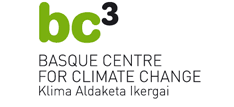- Home
- Events
- Seminars & Other Activities
- BC3 seminars: Prof. Carlo Giupponi, 7th of June
BC3 seminars: Prof. Carlo Giupponi, 7th of June
|
Seminar / Mintegia / Seminario |
||
|
Spatial and temporal
variabilities of land uses as affected by global change:
Lecturer: Abstract: Carlo Giupponi will present his role and the research and cooperation activities of the 2 institutions he's leading in Venice. At the global level, climate and socio-economic changes determine the patterns of the allocation and trade of resources in all markets. Top-Down computable general equilibrium (CGE) models look at the effects of global trends and generate trajectories of socio-economic indicators, such as prices of commodities in the global markets, volumes of trades, gross products per country and sectors. Those models are commonly used to analyse the evolution of global economies, under the pressure of climate change drivers, but their approach impose substantial simplifications in terms of spatial aggregation and interactions between socio-economic and environmental variables. When considering adaptation of social and ecological systems to climate change, their inherent complexity and non-linearity and their spatial and temporal variabilities put the usefulness of consolidated CGE approaches under question for long term projections. As a consequence, other methodological approaches are explored, and in particular more and more scholars explore Bottom-Up approaches, utilising mechanistic knowledge of physical/environmental phenomena and/or considering the behavioural diversity of economic agents, as a consequence of their diverse interactions with the surrounding environment and their bounded perceptions of the changing world. This work explores the potential for integration of the T-D and B-U approaches, with CGE models providing the macro-economic trends under the effects of global change scenarios and agent-based models (ABM) simulating grid-based land use change dynamics, with consideration of spatial (i.e. territorial) and temporal (e.g. climatic extremes and economic shocks) variabilities. We develop an approach that could be implemented worldwide as a means for zooming down from the global to the regional and local scale. The ABM prototype was developed and run with readily available global databases in three test areas around the Mediterranean Basin, in agricultural regions of Tunisia, Italy and Spain. Starting with extremely simplified and averaged settings; we sequentially introduce the available information about spatial and temporal variability and simulate the dynamics of water and land-use allocations and their consequences on economic performances. The coherency of the outcomes of ABM simulations with the macro trends provided by the CGE model is discussed in view of possible further developments in terms of improved integrated multi-scale simulation of global change scenarios and economic development.
Personal profile of the lecturer https://scholar.google.it/citations?user=_wytBPoAAAAJ&hl=en
|
 |
|
|
|
|
7th June, 12:00-13:00 BC3 offices * The Seminar will be in English. / Mintegia ingelesez burutuko da. / El seminario se realizará en inglés. |
